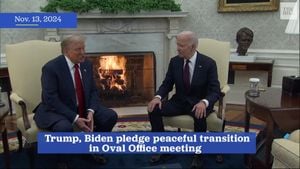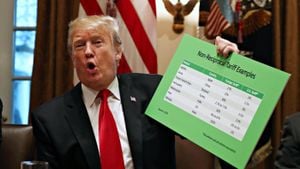The recent announcement by the Biden administration about the imposition of the first-ever federal "methane fee" has stirred considerable attention across various sectors of the economy, particularly within the oil and gas industry. Set to take effect next year, this initiative seeks to hold companies accountable for excessive methane emissions, labeling them as significant contributors to climate change.
At its core, the Environmental Protection Agency (EPA) finalized this rule to comply with directives laid out by Congress under the Inflation Reduction Act passed two years ago. This fee targets oil and gas facilities emitting methane beyond prescribed thresholds, and the feedback has been largely divided. Environmental groups are hailing it as necessary action against what they term corporate irresponsibility, whereas industry representatives raise alarms over potential economic repercussions.
The methane fee, officially known as the Waste Emissions Charge, will start at $900 per ton of methane emitted for the calendar year 2024. By 2025, it is expected to rise to $1,200 per ton, and then $1,500 per ton for 2026 and beyond. EPA Administrator Michael Regan noted the charge aims to incentivize oil and gas operators to adopt cleaner practices, enhancing efficiency and reducing harmful emissions.
Methane, recognized as one of the most potent greenhouse gases, holds over 80 times the warming power of carbon dioxide over two decades. Its sources primarily include flaring — the burning of gas during drilling operations — and leaks from aging pipelines. By stemming these issues through enforced fees, the administration anticipates achieving approximately 1.2 million metric tons of methane reduction by the year 2035, which the EPA indicates is equivalent to taking nearly eight million gas-powered cars off the road for one full year.
Despite these projections, the implementation of such regulations is bound to face significant challenges. Industry leaders and several Republican-led states have signaled plans to mount legal challenges against the new rule, claiming the EPA lacks the authority to impose such stringent financial penalties. They argue it complicates the operational ability of energy companies, impairing their capability to meet consumer demand.
The American Petroleum Institute (API), the oil and gas industry's key lobbying arm, voiced its concerns, stating, "This regulation hampers our ability to meet the growing energy needs of American families and businesses, and fails to advance meaningful emissions reduction." Many companies argue they have already made substantial strides to cut down methane emissions, citing data showing reduction by nearly 37% since 2015.
On the flip side, environmental advocates stress the necessity for rigorous monitoring and accountability within the drilling sector. Historically, oil and gas companies have opted to flare excess methane due to costs associated with repairing leaks or improving containment measures. Maggie Coulter, a representative from the Center for Biological Diversity, pointedly remarked, “While we expect the next administration to recklessly greenlight fossil fuel extraction, it’s heartening to see this effort to make polluters pay for their leakage of the super climate pollutant methane.”
Although the new fees set forth by the EPA represent monumental regulatory progress, there’s speculation about their longevity, particularly with elements of the political transition. Critics are questioning how resilient these regulations will be under future administrations, especially if Donald Trump returns to the presidency and continues efforts to dismantle regulations deemed excessive.
The Biden administration’s rationale behind the methane fee is multi-faceted: reducing guest emissions aligns with their broader environmental goals, bolstering U.S. leadership on climate mitigation strategies, and fostering innovation within the energy sector. This latest push, alongside other complementary measures, aims to transition not only how natural gas is perceived but also necessitates the industry to actively contribute to cleaner technologies.
Looking forward, it remains to be seen how much impact the methane fee will have on both emissions and energy prices, as opponents also warn of increase costs for consumers. Already, some fear the rise of natural gas prices could impede the transition away from fossil fuels.
Supporters posit these charges may incentivize the rapid adoption of available technologies to reduce emissions, creating broader benefits for the ecosystem. While unclear how challenges to the law will evolve, what is evident is the growing consensus among environmentalists about the urgent need to combat climate change, especially as the impacts become increasingly apparent.
For now, the focus rests on the operational response from oil and gas companies, alongside forthcoming legal battles which will surely shape the contours of this environmental policy.
The enforcement of the methane fee signifies the administration's commitment to confronting climate change headlong, making it clear the days of unregulated emissions without concequences are coming to an end.



